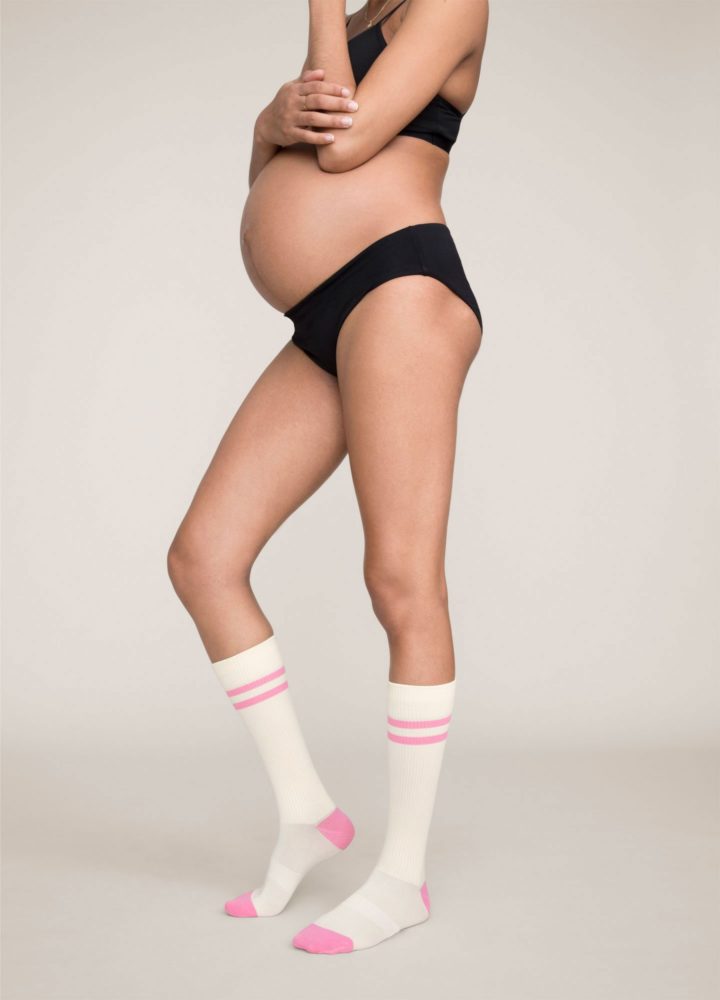Some of us dream about the day we will become pregnant and start motherhood. We imagine what it would be like to hold our baby bump and eat all the cartons of ice cream we want.
Getting to enjoy being able to kick our feet up with no judgment because we are literally growing a human being, and, well… we deserve a break. Pregnancy is one of those experiences that you cannot fully understand unless you’re going through it for yourself.
With all the ups and downs you may feel while you embark on this journey, just know that every expecting mama has hard symptoms that she doesn’t love. Every pregnancy is unique, but the symptoms that often come with them are very common. One of those symptoms is restless legs.
Most mamas-to-be only hear of fan-favorite pregnancy symptoms like morning sickness, fatigue, swollen feet and ankles, and obsession with mixing pickles and ice cream.
However, there are so many symptoms that women experience that are not very talked-about… restless legs being one of them.
What is restless legs syndrome brought on from pregnancy, and how can you manage it so you’re the most comfortable you can be?
What Is Restless Legs Syndrome?
If you’re feeling alone in this, let us lovingly stop you right there. You are not alone, mama.
One-third of all pregnant women experience restless legs syndrome, and those that have it describe it as an “itchy,” “throbbing,” “crawling,” “burning,” and a “creepy crawling” feeling in their legs that make them feel like they need to move their legs. Those intense feelings only seem to subside after moving the legs.
This very common pregnancy symptom usually occurs at night or while you’re sleeping, categorizing it as a sleep disorder. Having this pop up at night while you’re asleep will usually cause you to wake up (along with those four other trips you took to the bathroom).
Overall, totally inconvenient 0/10 — would not recommend. We all know a pregnant mama needs her sleep to be healthy and feel good.
If you happen to be experiencing restless legs syndrome, we know how frustrating it can be to deal with it, especially while you try to doze. Let’s talk about the science behind what causes this interesting symptom and how you can manage it so you’re getting the best shut-eye you can.
What Causes Restless Legs?
Recent research suggests that restless legs syndrome can be linked to genetics. Most people that experience it have a relative that also experienced it. Besides genetics, there are many possible causes, like hormones, nutrition, and lifestyle.
Do Hormones Contribute to Restless Leg Syndrome?
Hormones skyrocket and do their thing while you grow your adorable baby. These hormones can cause many reactions throughout the body, restless legs syndrome (RLS) being one of them. Studies have shown that pregnant women experiencing RLS had elevated hormone levels of estradiol and progesterone.
Do Diet and Nutrition Contribute to Restless Leg Syndrome?
Not getting enough iron in your diet can contribute to an iron deficiency which in turn can contribute to RLS. In fact, an iron deficiency is one of, if not the, most common reasons that restless leg syndrome starts rudely bothering us.
Sensitivity to certain foods can also be a possible risk factor. Ruling out sensitivities is something you can do with your healthcare team to try to kick this sleeping disorder to the curb.
Does Baby Placement Aggravate Restless Leg Syndrome?
As your baby continues to grow and put pressure on different areas, it’s possible your baby could be putting too much pressure on certain nerves connected to your sacrum, which could also be a reason for your restless legs during pregnancy.
Does Mental Health Influence Restless Leg Syndrome?
Many things can also trigger RLS, such as over-exhaustion, stress, anxiety, and depression. These are all triggers you can narrow down to see if they are factors causing your restless legs. If not, work with your provider to see if you may be deficient in anything or ask your family members if they’ve ever experienced this.
What Are the Symptoms Associated With Restless Legs Syndrome?
It’s not just restless legs; there are other symptoms associated with the sleep disorder. Besides the sensations that cause you to feel the urge to move, people usually experience sleep disruption from the sensations, bad bedtime habits, drowsiness during the day, and performance problems.
Since these sensations are so intense, you likely are waking during the night from them and having trouble sleeping or getting a full sleep cycle’s worth of rest. This will cause bad bedtime habits of staying up or your body getting used to moving so much during the night that you aren’t getting adequate amounts of rest.
Lack of sleep and quality rest will continue throughout your day, making you drowsy and always feeling tired. This can impact your behavior throughout the day, when hard situations arise and how you perform at your job or other tasks you do during the day.
How To Reduce Symptoms of Restless Leg Syndrome
Depending on what your doctor or midwife may suggest and what you feel comfortable with, there are some lifestyle changes you can make in the meantime that will help manage the symptoms or how you’re coping with it all.
Get More Sleep
This bit of advice might feel odd, given it’s hard to get much sleep to start with, but being intentional with your rest time and making sure you’re going to bed extra early to get as much sleep as possible will be best for your overall health.
Your body is going through so much physically and needs that rest. Even laying down and letting your body rest is the best thing you can do for yourself, especially if you’ve been chronically overtired and drained. Put on your favorite maternity pajamas, open your go-to book or streaming service, and chill hardcore.
Keep Track of Your Eating
This can be helpful for a couple of reasons. If your iron levels are too low, this could help you know to incorporate more iron-rich foods into your daily menu.
A food log is also great because you can see which foods might trigger your restless legs, helping you narrow down which foods might not be the best to keep eating.
Ask About a Blood Test
Going to your provider and getting a blood test will help check if you do indeed have an iron deficiency. If you do, they will most likely recommend taking an iron supplement or incorporating more delicious, iron-rich foods into your snacks of choice.
Apply Heat or Ice
If you are in the middle of experiencing the wild sensations that come with RLS, then applying something warm or cold can potentially bring temporary relief. Sometimes it can take trial and error to see how your body will respond to the different methods of symptom management.
Grab an ice pack for your leg, your cooling headband, and a nice iced lemonade (who doesn’t love a theme?).
Did Someone Say Acupuncture?
If after being cleared by your doctor or midwife, try acupuncture as it might be what really helps you find relief. Studies have shown how acupuncture has provided immediate relief from symptoms caused by restless legs.
Do What Works for You
Restless legs during pregnancy can be so frustrating to deal with. We know how it can take a toll not just physically but mentally. If you are finding it hard to cope with and are losing sleep from it, make sure to contact your provider. None of us can do this alone!
These are just a handful of options that are helpful when it comes to dealing with restless legs syndrome. Everyone’s unique, so what worked for one mama may not be what works for you and vice versa.
Keep in mind that it may take a while to see a change. None of these methods usually fix anything overnight. Rome wasn’t built in a day, nor can we grow a baby that quickly either.
Pregnancy is a short season of your life. Even if you happen to deal with restless legs your whole pregnancy, you will most likely not have to deal with it post-pregnancy and will be able to focus all on your baby and the next stage of life.
You’re doing great, mama. Keep your hope, try these fun tips, talk to your doctor and remember who you are and the incredibly hard work your body is putting in to create this beautiful human being that is your baby!
Sources:








